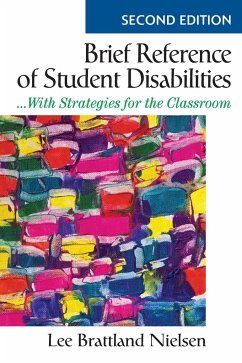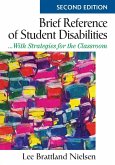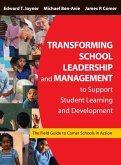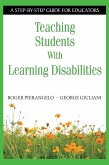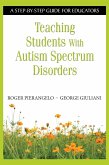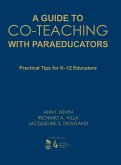- Gebundenes Buch
- Merkliste
- Auf die Merkliste
- Bewerten Bewerten
- Teilen
- Produkt teilen
- Produkterinnerung
- Produkterinnerung
This updated edition provides information about common exceptionalities, ADHD and bipolar disorder, legal considerations, and discussions on postsecondary transition, NCLB, and the reauthorization of IDEA 2004.
Andere Kunden interessierten sich auch für
![Brief Reference of Student Disabilities Brief Reference of Student Disabilities]() Lee Brattland NielsenBrief Reference of Student Disabilities43,99 €
Lee Brattland NielsenBrief Reference of Student Disabilities43,99 €![Transforming School Leadership and Management to Support Student Learning and Development Transforming School Leadership and Management to Support Student Learning and Development]() Edward T. JoynerTransforming School Leadership and Management to Support Student Learning and Development91,99 €
Edward T. JoynerTransforming School Leadership and Management to Support Student Learning and Development91,99 €![Teaching Students With Learning Disabilities Teaching Students With Learning Disabilities]() Roger PierangeloTeaching Students With Learning Disabilities84,99 €
Roger PierangeloTeaching Students With Learning Disabilities84,99 €![Histories of American Schools for the Deaf, 1817-1893 Histories of American Schools for the Deaf, 1817-1893]() Edward Allen FayHistories of American Schools for the Deaf, 1817-189350,99 €
Edward Allen FayHistories of American Schools for the Deaf, 1817-189350,99 €![Nurturing the Gifted Female Nurturing the Gifted Female]() Joy L. NavanNurturing the Gifted Female74,99 €
Joy L. NavanNurturing the Gifted Female74,99 €![Teaching Students with Autism Spectrum Disorders Teaching Students with Autism Spectrum Disorders]() Roger PierangeloTeaching Students with Autism Spectrum Disorders88,99 €
Roger PierangeloTeaching Students with Autism Spectrum Disorders88,99 €![A Guide to Co-Teaching with Paraeducators A Guide to Co-Teaching with Paraeducators]() Ann I. NevinA Guide to Co-Teaching with Paraeducators78,99 €
Ann I. NevinA Guide to Co-Teaching with Paraeducators78,99 €-
-
-
This updated edition provides information about common exceptionalities, ADHD and bipolar disorder, legal considerations, and discussions on postsecondary transition, NCLB, and the reauthorization of IDEA 2004.
Hinweis: Dieser Artikel kann nur an eine deutsche Lieferadresse ausgeliefert werden.
Hinweis: Dieser Artikel kann nur an eine deutsche Lieferadresse ausgeliefert werden.
Produktdetails
- Produktdetails
- Verlag: Corwin
- Artikelnr. des Verlages: B66320C
- 2. Auflage
- Seitenzahl: 274
- Erscheinungstermin: 5. September 2008
- Englisch
- Abmessung: 260mm x 183mm x 19mm
- Gewicht: 716g
- ISBN-13: 9781412966320
- ISBN-10: 1412966329
- Artikelnr.: 23502288
- Herstellerkennzeichnung
- Libri GmbH
- Europaallee 1
- 36244 Bad Hersfeld
- gpsr@libri.de
- Verlag: Corwin
- Artikelnr. des Verlages: B66320C
- 2. Auflage
- Seitenzahl: 274
- Erscheinungstermin: 5. September 2008
- Englisch
- Abmessung: 260mm x 183mm x 19mm
- Gewicht: 716g
- ISBN-13: 9781412966320
- ISBN-10: 1412966329
- Artikelnr.: 23502288
- Herstellerkennzeichnung
- Libri GmbH
- Europaallee 1
- 36244 Bad Hersfeld
- gpsr@libri.de
Lee Brattland Nielsen has taught for more than 25 years at the elementary, secondary, and university levels. While teaching at California Lutheran University, she taught "Mainstreaming the Exceptional Student" to teachers and students who were working toward their teaching credentials. She founded and worked for 2 years as the program director of WTHS, Dade County¿s educational broadcasting station in Miami, Florida. During this period, she coordinated all the educational programming. During her teaching experience, she has worked with many children with many types of exceptionalities. As a resource specialist teacher, she taught students with learning disabilities in the Los Angeles Unified School District. She believes in a positive approach to learning, with emphasis on building self-esteem in all students. Nielsen received her bachelor of arts degree from the University of Minnesota. She took postgraduate studies at the University of Florida; California State University, Northridge; University of California, Berkeley; and California Lutheran University. Her California teaching credentials include a Lifetime Standard Credential, a Special Education Learning Handicapped Credential, and a Special Education Resource Specialist Credential. She also has held teaching credentials in Arizona and Florida.
A Cautionary Note
Preface
Acknowledgments
About the Author
1. What Educators Need to Know About the Law
What the Law Provides
Discipline and Students With Disabilities
The Collaborative Team
2. How Teachers Can Create a Positive Learning Environment
Creating an Inclusive Environment
Teaching Students About Disabilities
Including Parents
3. Understanding the Parents of Exceptional Children
4. Disabilities and Health Disorders: Strategies for Educators
Aphasia
Asperger Syndrome
Attention Deficit/Hyperactivity Disorder
Auditory Processing Disorder
Autism
Bipolar Disorder
Cerebral Palsy
Down Syndrome
Dyslexia
Emotional Disturbance
Epilepsy
Fetal Alcohol Syndrome
Gifted Students With Learning Disabilties
Head Injury
Hearing Impairment
Learning Disabilities
Mental Retardation
Muscular Dystrophy
Speech Disorders
Spina Bifida
Spinal Cord Injury
Tourette Syndrome
Visual Impairment
Visual Processing Disorder
5. Other Health Conditions
Asthma
Diabetes
Heart Conditions
Hemophilia
A Note About Medications
Behavior Interventions
Resource A: Acronyms
Resource B: Public Agencies Offering Assistance to Individuals With
Disabilities and Their Families
State Education Departments
State Vocational Rehabilitation Agencies
Office of the State Coordinator of Vocational Education for Students with
Disabilities
State Mental Retardation and Developmental Disabilties Agencies
State Developmental Disabilities Councils
State Mental Health Agencies
Protection and Advocacy Agencies and Client Assistance Programs
Programs for Children With Special Health Care Needs
University Affiliated Programs
Directory of National Information Sources on Disabilities (NIS)
Resource C: Children¿s Books About Disabilities
Resource D: Associations to Contact
Resource E: Similarities and Differences: ADHD and Early Onset Bipolar
Disorder
Bibliography
References
Index
Preface
Acknowledgments
About the Author
1. What Educators Need to Know About the Law
What the Law Provides
Discipline and Students With Disabilities
The Collaborative Team
2. How Teachers Can Create a Positive Learning Environment
Creating an Inclusive Environment
Teaching Students About Disabilities
Including Parents
3. Understanding the Parents of Exceptional Children
4. Disabilities and Health Disorders: Strategies for Educators
Aphasia
Asperger Syndrome
Attention Deficit/Hyperactivity Disorder
Auditory Processing Disorder
Autism
Bipolar Disorder
Cerebral Palsy
Down Syndrome
Dyslexia
Emotional Disturbance
Epilepsy
Fetal Alcohol Syndrome
Gifted Students With Learning Disabilties
Head Injury
Hearing Impairment
Learning Disabilities
Mental Retardation
Muscular Dystrophy
Speech Disorders
Spina Bifida
Spinal Cord Injury
Tourette Syndrome
Visual Impairment
Visual Processing Disorder
5. Other Health Conditions
Asthma
Diabetes
Heart Conditions
Hemophilia
A Note About Medications
Behavior Interventions
Resource A: Acronyms
Resource B: Public Agencies Offering Assistance to Individuals With
Disabilities and Their Families
State Education Departments
State Vocational Rehabilitation Agencies
Office of the State Coordinator of Vocational Education for Students with
Disabilities
State Mental Retardation and Developmental Disabilties Agencies
State Developmental Disabilities Councils
State Mental Health Agencies
Protection and Advocacy Agencies and Client Assistance Programs
Programs for Children With Special Health Care Needs
University Affiliated Programs
Directory of National Information Sources on Disabilities (NIS)
Resource C: Children¿s Books About Disabilities
Resource D: Associations to Contact
Resource E: Similarities and Differences: ADHD and Early Onset Bipolar
Disorder
Bibliography
References
Index
A Cautionary Note
Preface
Acknowledgments
About the Author
1. What Educators Need to Know About the Law
What the Law Provides
Discipline and Students With Disabilities
The Collaborative Team
2. How Teachers Can Create a Positive Learning Environment
Creating an Inclusive Environment
Teaching Students About Disabilities
Including Parents
3. Understanding the Parents of Exceptional Children
4. Disabilities and Health Disorders: Strategies for Educators
Aphasia
Asperger Syndrome
Attention Deficit/Hyperactivity Disorder
Auditory Processing Disorder
Autism
Bipolar Disorder
Cerebral Palsy
Down Syndrome
Dyslexia
Emotional Disturbance
Epilepsy
Fetal Alcohol Syndrome
Gifted Students With Learning Disabilties
Head Injury
Hearing Impairment
Learning Disabilities
Mental Retardation
Muscular Dystrophy
Speech Disorders
Spina Bifida
Spinal Cord Injury
Tourette Syndrome
Visual Impairment
Visual Processing Disorder
5. Other Health Conditions
Asthma
Diabetes
Heart Conditions
Hemophilia
A Note About Medications
Behavior Interventions
Resource A: Acronyms
Resource B: Public Agencies Offering Assistance to Individuals With
Disabilities and Their Families
State Education Departments
State Vocational Rehabilitation Agencies
Office of the State Coordinator of Vocational Education for Students with
Disabilities
State Mental Retardation and Developmental Disabilties Agencies
State Developmental Disabilities Councils
State Mental Health Agencies
Protection and Advocacy Agencies and Client Assistance Programs
Programs for Children With Special Health Care Needs
University Affiliated Programs
Directory of National Information Sources on Disabilities (NIS)
Resource C: Children¿s Books About Disabilities
Resource D: Associations to Contact
Resource E: Similarities and Differences: ADHD and Early Onset Bipolar
Disorder
Bibliography
References
Index
Preface
Acknowledgments
About the Author
1. What Educators Need to Know About the Law
What the Law Provides
Discipline and Students With Disabilities
The Collaborative Team
2. How Teachers Can Create a Positive Learning Environment
Creating an Inclusive Environment
Teaching Students About Disabilities
Including Parents
3. Understanding the Parents of Exceptional Children
4. Disabilities and Health Disorders: Strategies for Educators
Aphasia
Asperger Syndrome
Attention Deficit/Hyperactivity Disorder
Auditory Processing Disorder
Autism
Bipolar Disorder
Cerebral Palsy
Down Syndrome
Dyslexia
Emotional Disturbance
Epilepsy
Fetal Alcohol Syndrome
Gifted Students With Learning Disabilties
Head Injury
Hearing Impairment
Learning Disabilities
Mental Retardation
Muscular Dystrophy
Speech Disorders
Spina Bifida
Spinal Cord Injury
Tourette Syndrome
Visual Impairment
Visual Processing Disorder
5. Other Health Conditions
Asthma
Diabetes
Heart Conditions
Hemophilia
A Note About Medications
Behavior Interventions
Resource A: Acronyms
Resource B: Public Agencies Offering Assistance to Individuals With
Disabilities and Their Families
State Education Departments
State Vocational Rehabilitation Agencies
Office of the State Coordinator of Vocational Education for Students with
Disabilities
State Mental Retardation and Developmental Disabilties Agencies
State Developmental Disabilities Councils
State Mental Health Agencies
Protection and Advocacy Agencies and Client Assistance Programs
Programs for Children With Special Health Care Needs
University Affiliated Programs
Directory of National Information Sources on Disabilities (NIS)
Resource C: Children¿s Books About Disabilities
Resource D: Associations to Contact
Resource E: Similarities and Differences: ADHD and Early Onset Bipolar
Disorder
Bibliography
References
Index

